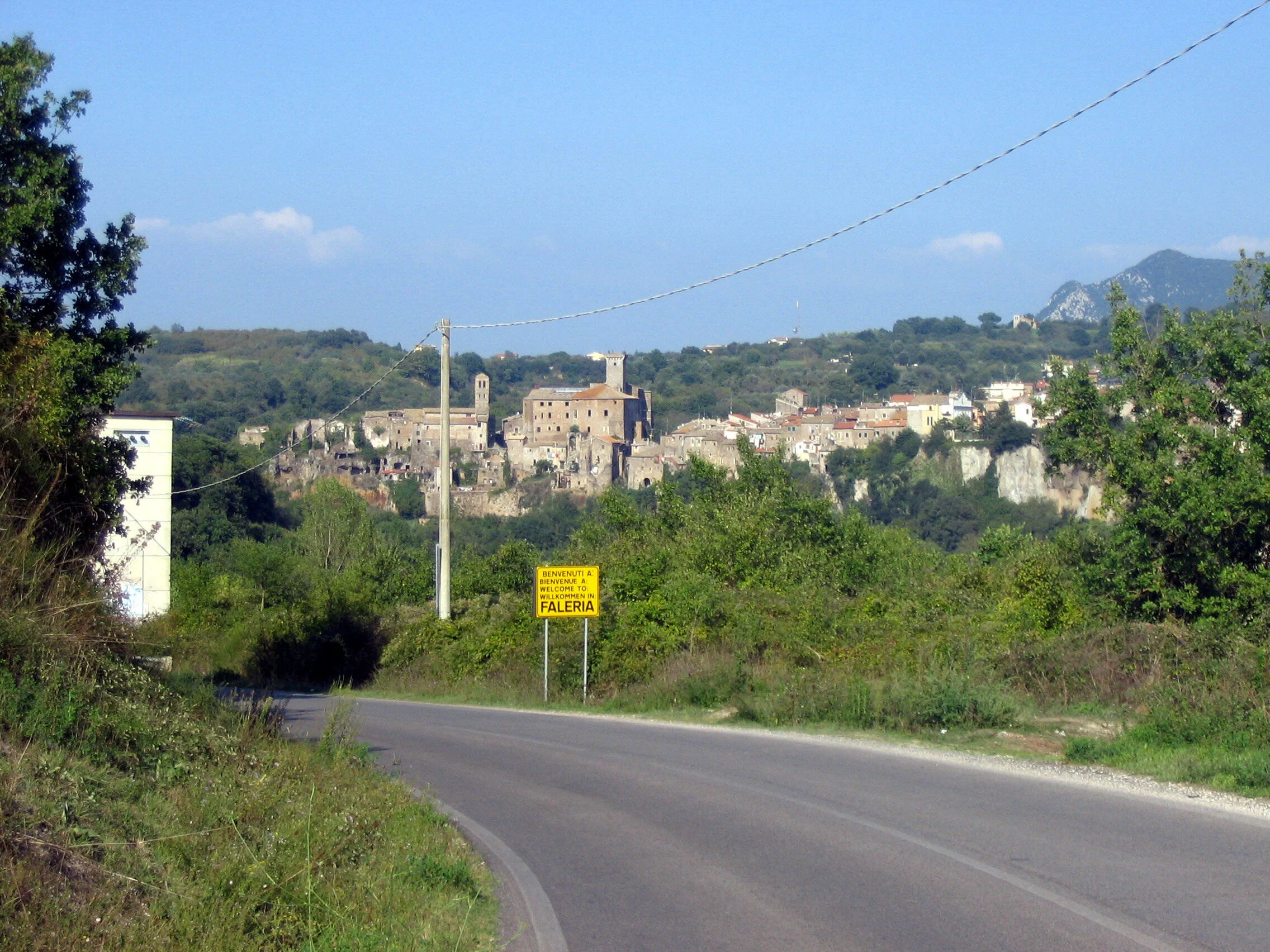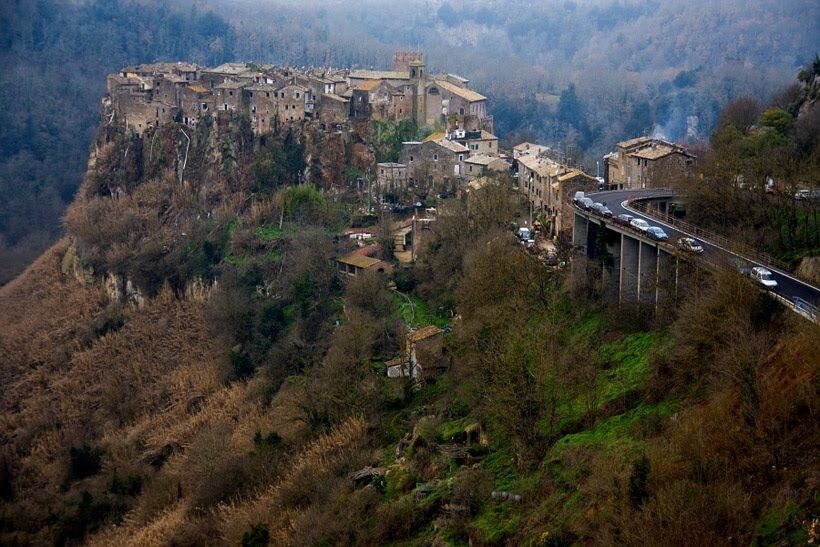The Great Italian Can Opener Conundrum
Seeking out common kitchen tools in the central Italian countryside is about as easy as saying “apriscatole” three times fast.
Faleria’s long-abandoned castle and Romanesque church loomed in the distance. As I strolled along the two-lane highway in the hinterlands of central Italy — clunky Fiats zooming past, coming within inches of rocketing me off the side of the road — I had nothing to do but think about the plight I was in. I was on a very primitive quest, one for the most basic, animalistic needs: I was in search of food. It is, ultimately, what has motivated anyone with a face and mobility to leave the cave. I’d just looked up the most important Italian word I’d use that day and I was trying my best to memorize it.
“Apriscatole. Apriscatole. Apriscatole,” I repeated. “Dove si puo trovare un apriscatole?”
I was actually living here in this medieval hill town called Calcata to undertake another type of quest: to research a book about the village relic that had gone missing (many said “stolen”), the Holy Foreskin (yes, that would be the foreskin of Jesus). And I was a week into my tenure when I’d gone to the not-so-super market in a neighboring village and went crazy when I saw they had cans of my favorite soup, zuppa di ceci (chickpea soup). I rushed home, anxious to pop open a can; I got out a saucepan, a bowl, and a spoon. Now I just had to open it. I scoured the corner of the main room that is the kitchen; where does one find a can opener, un apriscatole. Dove si pou trovare un apriscatole?
Oh, Calcata! Photo by David Farley
Not in Calcata. Just 30 miles north of Rome, Calcata has a small handful of stores: a shop that sells everything from African clothes to candles; a wooden box shop; a hat shop; and several art galleries. Thanks to the hippies and artists who make up Calcata’s population, if I wanted a sari or a turban or some incense, I’d only need to walk about fifty steps from my apartment. But if I needed something useful like, say, food or instruments that open containers of food, I’d have to walk for a while.
I got to Faleria’s main square, which was more like a crossroads. Cars and scooters flew through the intersection as old men with canes sat in lawn chairs watching them whiz by. In fact, there were old people everywhere. The entire town seemed like one big geriatric pasture.
The old men saw me — the pasty white guy who’s clearly not from around these parts — approaching.
“Buongiorno,” I said. “Dove si puo trovare…er…shit!” I forgot the word.
“Il castello?” one man offered, pointing the direction of castle.
“La chiesa?” another said. The church?
I shook my head from side to side.
“Calcata?” a third man said. I chuckled. Good guess.
I mimed opening a can.
“Un apriscatole?”
“Si,” I shouted with glee.
They looked at each other. I know it was a strange request and probably not a question they were asked on a daily basis. An argument ensued. Or at least it seemed like an argument; it was probably just a normal conversation.
Finally, one of the old men pointed down the street and began rambling a mouthful of directions. The problem, however, was this: I can speak Italian well enough to pose a question without sounding like a complete idiot, but when it comes to getting the answer, I am just that: a complete idiot. In fact, I’ve tried learning several languages in my life—Czech, German, Spanish—and always have the same problem: I can speak okay, but for some reason I have a hard time comprehending when someone speaks back to me.
When the old man finished his soliloquy of directions, I gave him my best, most exaggerated grazie mille and headed toward my new can opener.
“No, no, no!” one of the old men suddenly screamed at me, his hands raised over his head with the palms pointing skyward like I’d just committed some kind of unthinkable crime such as using his flowerbox for a urinal. “Where are you going? You were just told to go this way; not that way!” he said, in Italian, which I actually understood. The other three men, hands resting on their canes in front of them, were shaking their heads. Maybe they were on to me.
Right. I switched directions, and then headed the other way. Okay, chickpea soup here I come. When I got down the street, I had a choice between a women’s hair salon and a small grocery store. I wisely chose the latter. For better or worse, in America, you can pretty much get everything you need in the same shop: be it food, a prescription filled, new tires for your car, condoms, or a can opener, it’s all pretty much in the same place. Not so in Italy. Here there are specialized shops for everything, which means if you need several things, you could end up visiting a dozen different shops. It’s endearing, yes. But annoying when you don’t speak enough Italian to know which shop specializes in can openers.
At the same time, in smaller towns like, say, Calcata Nuova (the modern sibling of the medieval village I was living in), where there are only three shops, you’ll get an incongruent mish mash of things in one tiny shop: Intimo 2000, for example, not only sells women’s lingerie, but one could also buy a lottery ticket, make photo copies, and buy a children’s coloring book.
I finally got to the grocery store in Faleria the old men had pointed out. “By chance do you sell….” I forgot the word again and resorted to my miming routine to the 20-something girl behind the counter.
“Un apriscaltole!” she shouted, as if we were playing charades at a party.
“Yes!”
She brought her index finger up and rested it on her chin and looked heavenward, as if she was really thinking about it and then pointed in the direction of the old men. Of course, she was speaking a gazillion miles per minute and I understood exactly nothing.
But, in my stupid insistence to seem like I was more than just a dumb foreigner who spoke no Italian, I played along, thanking her for directions to the can opener shop.
The old men saw me approaching the square again. “Did you find your apriscatole?” one of the old men asked—or at least I think he asked.
“No. Not yet,” I said. “I couldn’t find the shop over there.”
“You couldn’t find it?” one of the old men said, laying the incredulity on thick. And then he began another finger-pointing session, down the street toward the grocery store and women’s hair salon again. His finger swerved and curled and twirled a couple times, which made me think I hadn’t gone far enough before. Okay, this time I’d walk past the grocery store and the women’s hair salon, take a couple lefts and rights, and there I’d find the can opener store. The one word I heard him say was posta, which means post office—and there was a post office back there. Or did he say posto, which simply means “place”?
So, once again, I gave a big grazie mille to the old men (I’m sure I was entertaining enough for them), and began walking back, this time passing the grocery store and women’s hair salon. I got to the post office and the only shop around was one selling shoes. Out of desperation I poked my head inside. No can openers.
I walked back toward the old men. Out of embarrassment, I ignored them, just walked right by without looking. I could feel their collective stare, but I wasn’t going to ask them again. I’d most certainly give at least one of them a heart attack. I’d get blamed for it and end up in some Italian prison, where there’d most certainly be a Holy Foreskin of a different sort waiting for me, and not the one I had been looking for.
Instead, I popped into a tobacco shop and asked the young salesclerk if she knew where I could find a can opener.
She thought about it for a long five seconds, staring hard up to the ceiling, before finally saying. “I don’t think there is a shop in Faleria that sells can openers. Try Rome.”
I made the two-mile trek back to Calcata feeling defeated. If I can’t find a can opener in the biggest town for miles then how am I going to find a Holy Foreskin? I wondered. A massive wave of self-doubt rushed over me and, already on just my first week in Calcata, I began wondering what I was doing here. Once again, Opels and Fiats whizzed past me on the highway. I walked over a bridge where, about 100 feet down, a small stream was running.
When I reached Calcata Nuova, which I had to cut through to get home to the medieval borgo, I stopped into the grocery store to pick up some non-canned goods for lunch and dinner that evening. Even after just a couple days, the clerk already knew me.
“Ciao, come va?” she said. How’s it going?
“I walked a few kilometers to Faleria for a can opener, but they don’t have can openers. Or maybe they do, but I couldn’t find the shop.”
“Un apriscatole? We have them here in Calcata Nuova,” she said, pulling me by my shirt sleeve out the front door to the street and pointing to the lingerie shop, Intimo 2000 “The shop there — you know, the one that sells everything. They will have un apriscatole.”
I trudged up to the lingerie/photocopy/children’s book shop where I purchased a can opener. Over a very rewarding bowl of chickpea soup, I thought about what I still needed for the apartment: a lamp and a rug. And then promptly reached for my English-Italian dictionary and began my next quest anew.



